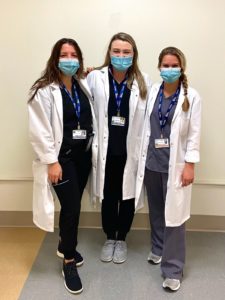A FEES test is an instrumental exam used to assess if, how well, and what a patient can safely swallow. During the procedure, a highly trained speech-language pathologist (SLP) passes a thin, flexible transnasal-pharyngascope through the patient’s nose to view the anatomy and physiology of the swallow. Simple. The hard part is when the patient has considerable difficulty following directions, as when a patient has Alzheimer’s Dementia (AD).
Working as a mobile FEES clinician that predominantly works in skilled nursing facilities, we inevitably see patients with dementia. In older persons, food and fluid intake are often already reduced due to age-related changes, chewing problems, or cognitive decline. Thus, older patients suffering from dysphagia are at high risk of developing malnutrition and dehydration. Depending on the advancement of the patient’s dementia, they may present as confused, scared, or even, combative. Our approach has to reflect the cognitive status of our patient and we may have to alter our protocols appropriately.
Here are a few tips to decrease confusion and agitation:
- Orient Orient Orient
Remind your patient who you are and what you are doing today and why you are doing the exam. If the patient seems confused about your identity, reorient as needed. Make sure you are using clear, understandable directions. Use clear body language and do your best to look calm and professional.
2. Familiar place and people
Familiar people loved ones, and even familiar staff that works with the patient every day can help keep the person calm and relaxed for the exam. Any opportunity to show care and concern can be appreciated by your patient.
3. Caregiver education
Often, these tests are designed to find the appropriate diet and rule out silent aspiration. The patient who suffers from Alzheimer’s dementia may forget the results or even the exam a day after it happened. They often will want to go back to eating what and how they were before your recommendations. Explaining your recommendations to floor staff, nurses, CNAs, and treating clinicians will allow the people who see the patient daily to guide the new and appropriate behaviors we need to keep the patient safe and healthy.
If you have any questions about FEES or speech therapy services for skilled nursing facilities, please send me a message. I’d love to be a resource to you.
About the Author:
Michael Webb, CCC-SLP, is the CEO of Language Fundamentals & a practicing FEES clinician. Michael instructs graduate students in FEES at the Communication Disorders Department at SUNY New Paltz. He also served as a member of the department chair search committee for the newly developed State University of New York at Stony Brook University Communication Disorders program and was since appointed to the position of Clinical Instructor in the School of Health Technology and Management.



